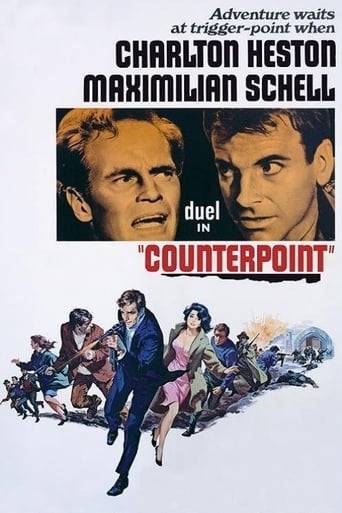Por cada movimiento ... un contraataque - por cada ataque ... ¡un contraataque!
"Counterpoint" (1967), a gripping war drama produced by Universal Pictures, masterfully intertwines the tension of World War II with the elegance of classical music. Directed by Ralph Nelson, the film stars Charlton Heston as Lionel Evans, a renowned orchestra conductor, who finds himself and his ensemble captured by German forces during a concert tour in Belgium. The narrative unfolds as the soldiers, led by the cultured yet ruthless Colonel Arndt, played by Maximilian Schell, force the musicians to perform for them, creating a unique juxtaposition of art and warfare. This film stands out for its exploration of the power of music as a universal language that transcends the brutalities of war, offering moments of humanity amidst chaos. The film's setting and atmosphere are meticulously crafted, with the stark contrast between the refined world of classical music and the harsh realities of the battlefield serving as a constant reminder of the war's omnipresence. The performances by Heston and Schell are particularly noteworthy, as they bring depth and complexity to their characters. Heston's portrayal of Evans captures the conductor's internal struggle between survival and maintaining his artistic integrity, while Schell's Colonel Arndt is a study in contradictions—a man who appreciates the beauty of music yet remains committed to the Nazi cause. Their interactions drive the film's tension, culminating in a dramatic climax that tests the limits of both art and survival. "Counterpoint" also delves into themes of resistance and resilience, as the orchestra members grapple with their captivity and the moral dilemmas it presents. The film subtly explores the idea of using art as a form of resistance, with the musicians finding ways to assert their dignity and humanity through their performances. The score, featuring works by Beethoven, Brahms, and Tchaikovsky, not only enhances the film's emotional impact but also serves as a character in its own right, reflecting the inner turmoil and hope of the characters. The use of these classical pieces underscores the film's message about the enduring power of art in the face of oppression. In its time, "Counterpoint" was a bold cinematic endeavor that dared to blend the worlds of war and music in a way that was both thought-provoking and emotionally resonant. While it may not have received the widespread acclaim of other war films of its era, it remains a compelling testament to the resilience of the human spirit and the transcendent nature of art. Universal Pictures' decision to produce such a unique narrative highlights the studio's willingness to explore unconventional themes, making "Counterpoint" a memorable addition to the canon of war dramas.
Año1967
Duración106 minuto
GénerosBélicaDramaSuspense
Países de producciónUnited States of America

